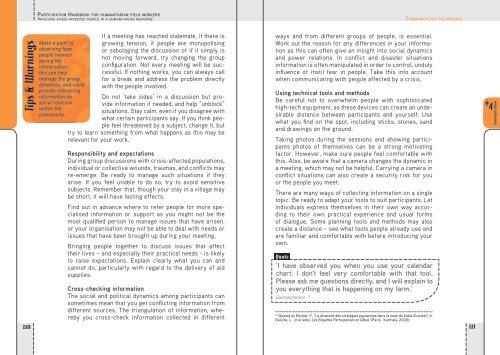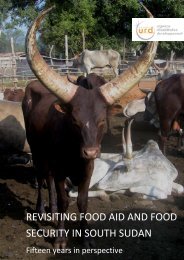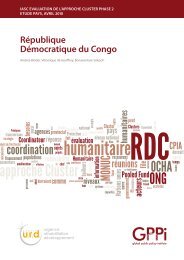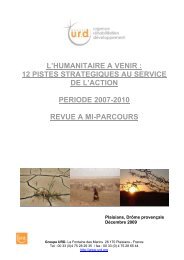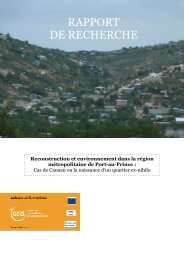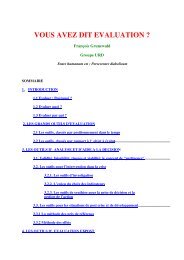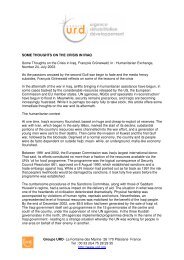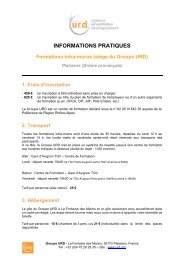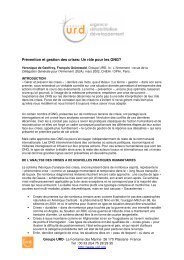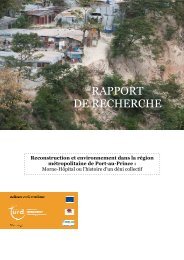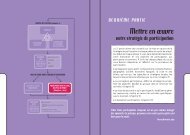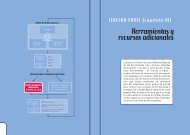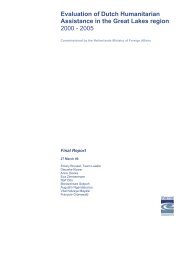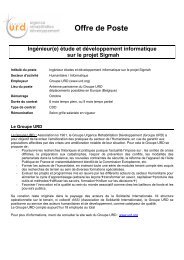Chapter 4 - Groupe URD
Chapter 4 - Groupe URD
Chapter 4 - Groupe URD
Create successful ePaper yourself
Turn your PDF publications into a flip-book with our unique Google optimized e-Paper software.
Participation Ha n d b o o k fo r hu m a n i t a r i a n fi e l d wo r k e r sInv o l v i n g crisis-af f e c t e d pe o p l e in a hu m a n i t a r i a n re s p o n s eCo m m u n i c a t i o n te c h n i q u e sTips & Warnings110Make a point ofobserving howpeople interactduring theconversation;this can helpmanage the groupdynamics, and couldprovide interestinginformation onsocial relationswithin thecommunity.If a meeting has reached stalemate, if there isgrowing tension, if people are monopolisingor sabotaging the discussion or if it simply isnot moving forward, try changing the groupconfiguration. Not every meeting will be successful.If nothing works, you can always callfor a break and address the problem directlywith the people involved.Do not ‘take sides’ in a discussion but provideinformation if needed, and help “unblock”situations. Stay calm, even if you disagree withwhat certain participants say. If you think peoplefeel threatened by a subject, change it, buttry to learn something from what happens as this may berelevant for your work.Responsibility and expectationsDuring group discussions with crisis-affected populations,individual or collective wounds, traumas, and conflicts mayre-emerge. Be ready to manage such situations if theyarise. If you feel unable to do so, try to avoid sensitivesubjects. Remember that, though your stay in a village maybe short, it will have lasting effects.Find out in advance where to refer people for more specialisedinformation or support as you might not be themost qualified person to manage issues that have arisen,or your organisation may not be able to deal with needs orissues that have been brought up during your meeting.Bringing people together to discuss issues that affecttheir lives – and especially their practical needs - is likelyto raise expectations. Explain clearly what you can andcannot do, particularly with regard to the delivery of aidsupplies.Cross-checking informationThe social and political dynamics among participants cansometimes mean that you get conflicting information fromdifferent sources. The triangulation of information, wherebyyou cross-check information collected in differentways and from different groups of people, is essential.Work out the reason for any differences in your informationas this can often give an insight into social dynamicsand power relations. In conflict and disaster situationsinformation is often manipulated in order to control, undulyinfluence or instil fear in people. Take this into accountwhen communicating with people affected by a crisis.Using technical tools and methodsBe careful not to overwhelm people with sophisticatedhigh-tech equipment, as these devices can create an undesirabledistance between participants and yourself. Usewhat you find on the spot, including sticks, stones, sandand drawings on the ground.Taking photos during the sessions and showing participantsphotos of themselves can be a strong motivatingfactor. However, make sure people feel comfortable withthis. Also, be aware that a camera changes the dynamic ina meeting, which may not be helpful. Carrying a camera inconflict situations can also create a security risk for youor the people you meet.There are many ways of collecting information on a singletopic. Be ready to adapt your tools to suit participants. Letindividuals express themselves in their own way accordingto their own practical experience and usual formsof dialogue. Some planning tools and methods may alsocreate a distance – see what tools people already use andare familiar and comfortable with before introducing yourown.Quote‘I have observed you when you use your calendarchart. I don’t feel very comfortable with that tool.Please ask me questions directly, and I will explain toyou everything that is happening on my farm.’Guinean farmer. 1010Quoted by Boulier, F., ‘La diversité des stratégies paysannes dans la zone de Koba (Guinée)’, inDelville, L. et al (eds), Les Enquêtes Participatives en Débat, (Paris : Karthala, 2000).111#4Communication


